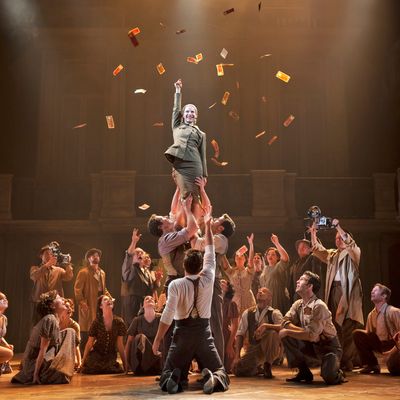
Descamisados, prick up your ears! Your Evita is up in arms again. Back from the dead for the first time since 1979 (her first and last appearance on Broadway, till now), the Andrew Lloyd Webber–Tim Rice version of Argentine First Lady and demi-saint Eva Perón (Elena Roger) is once again defying the phallocratic, foot-stomping Argentine military! She’s fighting the narrow-minded middle classes! She’s fighting the uncooperative upper classes! She’s fighting her uncooperative upper-register! Santa Evita’s hunger is palpable, her ambition unlimited, her singing … well, reasonable people can disagree. (Wasn’t that the slogan of the Perón campaign in ’46? Oh, wait: It totally wasn’t.) But reasonably or unreasonably, critics and actual humans alike will disagree on this production. Cloaked in fathomless imperial shadow by director Michael Grandage, choreographed stirringly and busily by Rob Ashford, and featuring both the affably translucent presence of pop-star Ricky Martin (as Che, our Cherrator) and the one-of-a-kind voice of Roger (a de gustibus proposition if ever there was one), this latest iteration of Evita seems guaranteed to produce more discord than harmony — not unlike the woman herself.
Personally, I am among the unmoved, if not the unimpressed. Grandage’s imposing new vision uses the Marquis’s vast, cavernous tastelessness to suitably overblown effect. He opens in an almost Eisensteinian tableau, faceless mourners silhouetted as a huge movie screen, showing newsreel footage of Eva’s state funeral, comes crushing down from above. The imagery and the powerfully dissonant Lloyd Webber McRequiem that accompanies it combine terrifically. Then Martin pops out of the crowd, and problems begin. It’s not that his Che is awful: His singing is strong enough, clear enough, bright enough. It’s not enough. Martin, a star playing an everyman, simply isn’t distinctive — his everyman is just too “every.” As the show blows through the life of Eva Duarte, a small-town girl with big-city ambitions and sexual pragmatism to match (a necessary pairing in the macho world of postwar Argentina), Che is our guide and gadfly. Originally, he took a Marxist tack. (Mandy Patinkin played him in beret and beard, which would, of course, look ridiculous today, and by some accounts looked ridiculous back then.) Now he’s more of a fly on the wall, which is a better move. But where’s the attitude, the anger, the anything? He’s little more than an avid grin and an Errol Flynn pose — the rest fades instantly into the scenery. There’s no consistent sentiment of any detectable level in Martin, no visceral critique of the lady in question, beyond the mountains of Ricean info-babble he’s called upon to sing. No one writes a character lyric from the outside in like Rice: His characters speak-sing as if their self-knowledge is derived entirely from graduate theses written decades after their deaths. And what they speak-sing! “There is evil, ever around / Fundamental system of government / Quite incidental…” Lyrics or Chuck Grassley Tweets? Place your bets.
But chances are, you’re not here for lyrics. Or Che. Or even Michael Cerveris’s lacquered Juan Perón, who bears a shocking resemblance to a young Silvio Berlusconi. You’re here for the goalpost arms, the bedraped balcony, the brass pipes on the bottle blonde. Well, here she is, all 60 inches of her. London went mad for Roger, an Argentine native of winningly diminutive size. Her elfin apoplexies and unique vocal interpretation were met with English bouquets. But personally, I found her performance almost too good a fit with Rice’s jagged, herky-jerky lyrics: She is memorable in part because she is irritating. Her top notes can approximate a subway-gate alarm, and her quick-runs in tricky passages (“Good Night and Thank You”) throw all normal concepts of pitch to the wayside: It’s as if her voice breaks a heel and just keeps hobbling at high-speed. There’s pathos and genuineness in this approach, to be sure, but the whole thing felt a tad shambolic to me. One spot where it works (un)beautifully: her tense, piercing “Don’t Cry for Me Argentina,” which she delivers with a hypodermic. Finally, a version of this song that doesn’t allow you to relax and luxuriate in its melodic velour! Roger, whatever else she’s doing up there, keeps us on our toes.
But as for our hearts — well, mine remained un-won. Roger doesn’t do a lot of reaching out. There’s a need and an eagerness to her Eva, but no seduction, no “star quality.” She reaches inward for strength, not out to the crowd. All of the leads, in fact, remain marooned in bright pools of focused self-regard. The added ballad “You Must Love Me,” imported from the Madonna movie of 1996, unfolds very sweetly, but beyond that lovely moment, the surprisingly uncynical love that’s supposed to bloom between the political animals Juan and Eva remains rather cool to the touch. (Nothing puts a hot scene on ice like wads of lyrics about trade unions.) As for Evita and Che, well, I’m not sure what’s being debated: One is a solipsist, the other a cipher, and neither seems capable of looking the other in the eye, no matter how snugly Ashford interlocks them. Part of the blame goes to the show itself, so stuffed with luscious pop motifs, so strangely devoid of emotion. I found my mind wandering off to Paraguay and points beyond. Why, Santa Evita, why? “Tell me before I seek worthier pastures,” as Rice might put it, “And thereby restore self-esteem.” Whatever the hell that means.

